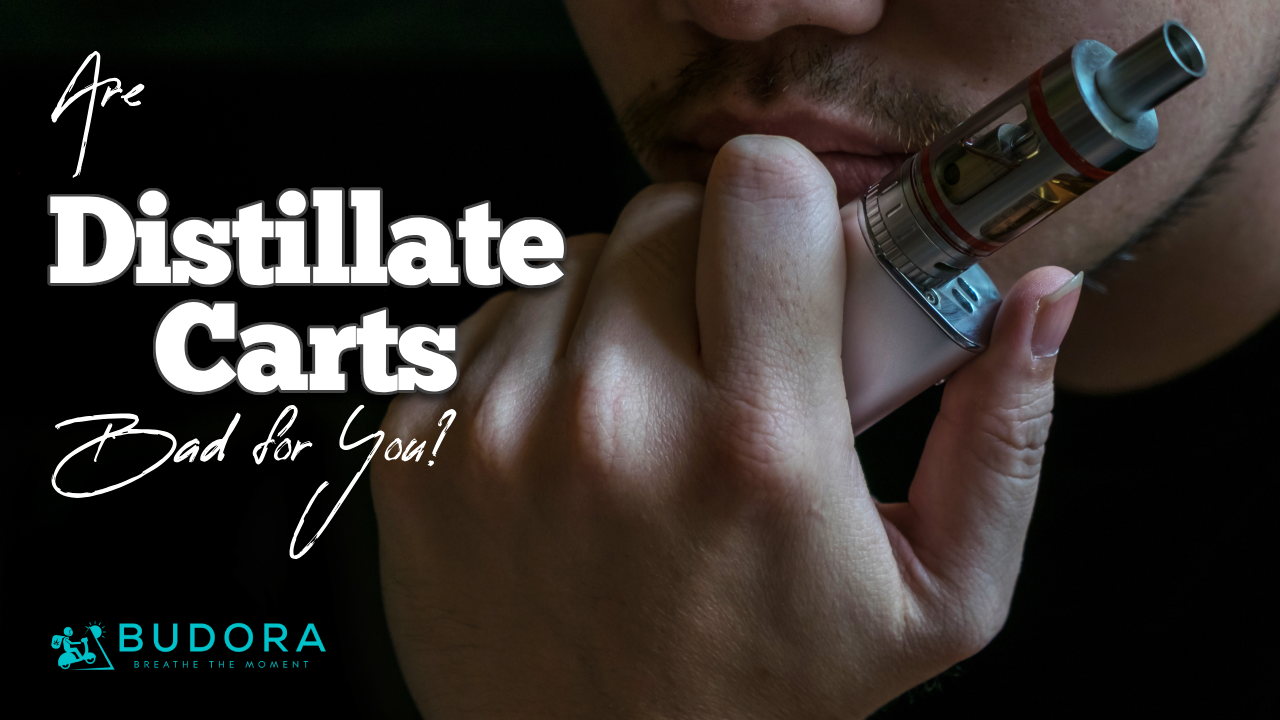Blog


Are Distillate Carts Bad for You? Here’s What Science Says
- Budora Team
- No Comments
In recent years, THC distillate cartridges—commonly known as “distillate carts”—have gained immense popularity among cannabis consumers due to their potency, convenience, and sleek design. But with increased usage comes a critical question: Are distillate carts bad for you? While they promise a powerful high, there’s growing concern about what’s actually in those cartridges and how they affect our health.
This blog explores the scientific perspective on the safety of distillate carts. We’ll break down how they’re made, what distinguishes them from other cannabis extracts, and whether they pose legitimate health risks.
Key Highlights
- THC distillate carts are highly potent and convenient, but may pose health risks if they contain additives like vitamin E acetate or residual solvents.
- Live resin carts are generally considered safer than distillates due to their natural terpene profiles and fewer synthetic ingredients.
- Choosing lab-tested, reputable products and understanding the distillation process are essential for minimizing health risks with distillate use.
What Are Distillate Carts?
Before diving into the safety debate, let’s first clarify what we’re talking about. A distillate cart contains THC distillate oil, a highly refined form of cannabis extract. Through a process of distillation, unwanted compounds such as chlorophyll, fats, and waxes are removed, leaving behind a nearly pure THC substance, often exceeding 90% potency.
Distillate carts are commonly consumed through vape pens, such as the Budcraft Distillate Cartridge, which heat the oil to produce vapor instead of smoke. This delivery method is popular because it’s discreet, fast-acting, and doesn’t require combustion.
How Is the Distillate Made?
Understanding the production process is key to evaluating the safety of distillate carts. So, how is the distillate made?
The distillation process involves several steps:
Extraction
Cannabinoids are first pulled from the cannabis plant using solvents like ethanol or CO₂.
Winterization
This step removes fats, lipids, and waxes.
Decarboxylation
Heat is applied to activate THC (tetrahydrocannabinol), the psychoactive compound.
Distillation
The final step uses heat and vacuum pressure to separate and purify THC, leaving behind a potent oil.
Are Distillate Carts Bad for You?
So, are distillate carts bad for you? The answer is nuanced. While distillate carts are generally considered safe when produced properly and used responsibly, several factors can turn them into a health risk.
Additives and Cutting Agents
One of the biggest concerns with distillate carts lies not in the THC distillate oil itself, but in what’s added to it. Some manufacturers include thinning agents like propylene glycol (PG), polyethylene glycol (PEG), or vitamin E acetate to alter the oil’s viscosity. HTFSE distillates, like those from Green Supreme, typically contain fewer additives, offering a more concentrated and pure product for experienced consumers.
The CDC has linked vitamin E acetate to cases of EVALI (e-cigarette or vaping-associated lung injury), a condition that caused severe respiratory issues and even deaths in 2019.
Always choose products from reputable brands that offer third-party lab testing.
Residual Solvents
During the extraction and distillation process, solvents like butane or ethanol are used. If not properly purged, trace amounts can remain in the final product. These residual solvents can irritate the lungs or even be toxic in high amounts.
So again, the answer to “Are distillate carts bad for you?” heavily depends on manufacturing standards and testing protocols.
Lack of Entourage Effect
THC distillate is stripped of most cannabinoids and terpenes found in whole-plant cannabis. While this gives a purer, more intense THC experience, it removes the synergistic benefits of the “entourage effect,” where multiple compounds work together to enhance therapeutic outcomes.
Without this natural balance, users may experience increased anxiety or a shorter-lasting high. This is where the live resin vs distillate cart debate enters the picture.
Live Resin vs Distillate Cart: What’s the Real Difference?
When choosing between live resin and distillate carts, such as the Faded Live Resin FSE Vape Pens or the Budcraft Distillate Cartridge, it’s important to understand their core differences in composition, effects, and safety.
| Feature | Live Resin | Distillate Cart |
|---|---|---|
| Source Material | Made from fresh-frozen cannabis plants right after harvest | Made from dried and cured cannabis or trim |
| Cannabinoid & Terpene Profile | Retains a full spectrum of cannabinoids and terpenes | Primarily pure THC with little to no natural terpenes |
| Flavor & Aroma | Rich, authentic cannabis flavor and aroma due to terpene preservation | Often neutral or artificially flavored |
| Potency | Moderate to high THC, balanced with other cannabinoids | Extremely high THC potency, often over 90% |
| User Experience | Delivers a more balanced, entourage effect | Offers an intense, isolated high |
| Safety Factors | Fewer additives if well-made; more natural | May include cutting agents, artificial terpenes, or thinning compounds |
| Best For | Connoisseurs seeking flavorful, full-spectrum effects | Users chasing maximum THC potency and quick onset |
Which One Is Safer?
From a safety perspective, live resin may be the better option, especially when comparing live resin vs distillate cart. It’s typically free from synthetic additives and maintains more of the plant’s natural compounds, which may contribute to a gentler and more therapeutic experience. However, both can be safe if manufactured responsibly and lab-tested.
For more detailed information on consuming live resin, refer to our guide on how to smoke live resin.
Is THC Distillate Safe?
Now, to another commonly asked question: Is THC distillate safe? In its pure form, yes—THC distillate is generally safe to consume. However, this assumes the absence of harmful contaminants and proper use.
Potential risks include:
Overconsumption
Due to its high potency, it’s easy to consume too much THC, especially for novice users. This can lead to paranoia, dizziness, and an elevated heart rate.
Lung irritation
Inhaling anything, whether vapor or smoke, can irritate the lungs over time.
Long-term effects
Research is still ongoing about the long-term health implications of vaping THC oils.
D9 Distillate: A Note on Legality and Purity
The term D9 distillate refers to delta-9 tetrahydrocannabinol, the most well-known and psychoactive form of THC. In regulated markets, D9 distillate is made under strict standards to ensure purity and safety.
However, in unregulated or gray markets, D9 distillate may be produced in unsafe conditions. It’s not uncommon to find mislabeled or counterfeit cartridges that contain synthetic cannabinoids or other harmful additives.
If you’re exploring different concentrate options, you might be wondering: What about rosin? This solventless concentrate has been gaining attention, and for good reason. To dive deeper into its benefits and how it’s made, check out our guide on rosin.
Tips for Choosing Safe Distillate Carts
To protect your health and enjoy a positive experience, follow these guidelines:
- Buy from licensed dispensaries – Avoid black-market or unverified sources.
- Check for lab results – Look for certificates of analysis (COAs) from third-party labs.
- Avoid artificial flavors and thinners – Natural cannabis-derived terpenes are safer and more effective.
- Read customer reviews – Reputable brands usually have a track record you can evaluate.
Conclusion: Are Distillate Carts Bad for You?
So, are distillate carts bad for you? The truth is, they can be—but not inherently. The risk comes from poorly made or unregulated products that may contain contaminants, thinning agents, or misrepresented ingredients.
On the flip side, THC distillate oil that’s produced under strict quality control and used responsibly can be a convenient and effective way to consume cannabis. The key is education, transparency, and responsible usage.
Informed consumers must ask questions like “how is the distillate made”, compare live resin vs distillate carts, and understand the implications of using D9 distillate. With a little research and cautious decision-making, you can enjoy the benefits of cannabis while minimizing the risks.
Frequently Asked Questions
Is Distillate Worse for You Than Live Resin?
It depends on your goals. Live resin offers a full spectrum of cannabinoids and terpenes, providing a more balanced experience. Distillate, on the other hand, offers higher potency for specific cannabinoids, like THC or CBD.
Is Live Resin Better for Your Lungs?
Research suggests cannabis may have a positive impact on lung health, particularly when used as a natural anti-inflammatory. Live resin can support lung health due to its anti-inflammatory properties from cannabinoids.
Can Lungs Heal After 3 Years of Vaping?
Yes, lungs can heal after 3 years of vaping. While some damage is reversible, conditions like lung scarring may persist. Quitting vaping as soon as possible helps speed up recovery.
Is Distillate High Better Than Flower High?
Distillate provides a more potent high due to its high THC concentration, offering an intense experience compared to regular flower. However, flower highs may offer a more balanced, full-spectrum effect.
Does EVALI Go Away?
EVALI symptoms may improve or become reversible with proper treatment and cessation of vaping. However, the long-term effects vary depending on the severity of the condition.
Like this article?

Budora Team
OTHER ARTICLES YOU MAY LIKE



